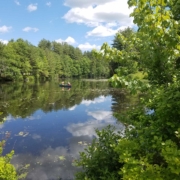Water Planning Committee Meeting Summary June 10, 2019 Webinar
- Call to Order—Chair Jennifer Hoggatt-Missouri DNR-Webinar began at 10:03 a.m. Central time.
- Introductions of Participants on the call—Jennifer Hoggatt, MO DNR, Chair; Sue Lowry, ICWP Executive Director; Jodee Pring, Wyoming WDO; Brian Atkins Alabama OWRE; Pooja Kanwar, MN DNR; Lauren Salvato and Kirsten Wallace, UMRBA; Andrew Warner, CDM-Smith; Julie Cunningham, OKWRB; and Jennifer Schellpeper, NE DNR.
- State Water Planning Presentations: organization and legislative mandates for water quantity planning
- Missouri: Jennifer Hoggatt
Jennifer started with the organization of the MO Geological Survey and how the water center/planning work came to be a part of this agency. MO is Riparian rights state and no water use permitting is required. Disputes between water users are litigated in civil court. Major water users do have a reporting requirement for uses > 100K gallons per day. Not much recourse if reports don’t get submitted. Water Resources Center is funded through General Revenue Fund. Use PAS grants for much work and just received this year funding for a State Water Plan Implementation Program ($1M per Fiscal year). Drought Planning; Watershed Studies and Updated Bathymetric Survey’s are 3 areas to concentrate new funds.
MO works on Regional Water Development projects and Investigations in addition to main State Water Resources Plan. Technical Work groups—about 125 members of the public serve in these areas: Consumptive Needs, Infrastructure, Non-Consumptive Needs, Agriculture, Water Quality. Dichotomy from north to south in water resources in MO: in the north use more surface water, almost exclusively groundwater use in the south. Regional water development is sponsor/local driven—state only provides technical help.
- Minnesota: Pooja Kanwar
Pooja gave an overview of water planning in Minnesota. MN is known as Land of 10,000 Lakes, so ample surface water supplies. Also border Lake Superior—3 main watersheds: Mississippi, Red River and Great Lakes. 3 State agencies deal on the Water Quality side and DNR responsible for Water Quantity. Public Trust Doctrine—legal obligation to protect water resources for the benefit of the public. MN is a Riparian state, but has a permitting system. Permitting system does not give preference to earlier rights. July 1, 1937 was beginning of permitting system. Uses greater than 10K gal/day or 1M gal/year.need to be permitted. Among permits during times of shortage there are water allocation priorities among 6 priorities.
Funding: Ballot Measurethat increased in 2009-2034 sales tax by 3/8 of 1%. 1/3 of this increased sales tax revenue goes into Clean Water Fund. 2019-$212M over $860M since 2009. 1988-Environmental and Natural Resources Trust Fund-lottery funding and can accept outside funds. Passage of 2009 Act increased the public’s expectation of water management and planning. Strategies at the HUC 8 scale. Special Assessment Districts-need legislative approval, but not voter approval.
Program Vision: One Watershed/One Plan-Targeted local implementation plans aligned with state strategies on major watershed boundaries. Board of Water and Soil Resources implementing agenda and Pooja suggests we might want to ask Julie Westerlund from the BWSR to give more detail in the future.
- Topics and speakers for future water planning learning opportunities: Following up with hearing how other states work on the same topics that Pooja and Jennifer presented. Suggestion for Jodee Pring and Jennifer Schellpeper to do a similar compare and contrast. Next call could ask Julie Westerlund to present (25-30 minutes) and then provide committee members a list of topic areas for discussion (such as Funding sources, local involvement, etc). Jodee Pring and Jennifer Schellpeper will coordinate on making a similar presentation to today’s in August.
- Planning related topics for Mobile Annual Meeting, Oct. 8-10, 2019
- Some topics were discussed on last call
- Any additional ideas?—Please send them to Sue by end of June.
- Relevant activities from other ICWP committees:
- Request to USGS to summarize WUDR Grant info—includes some water planning topics
- Interstates Committee update of 2006 Report—statutory section
- Next call or webinar—Pooja will reach out to Julie Westerlund for her availability on July 15. (Post meeting note: Julie is confirmed and next committee webinar will be Monday, July 15 at 10 a.m. Central.)

